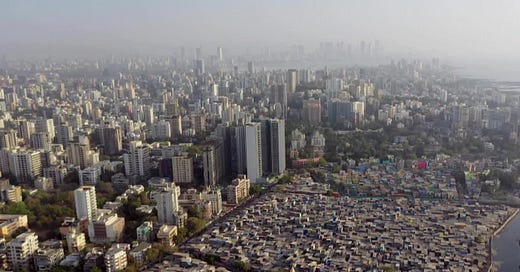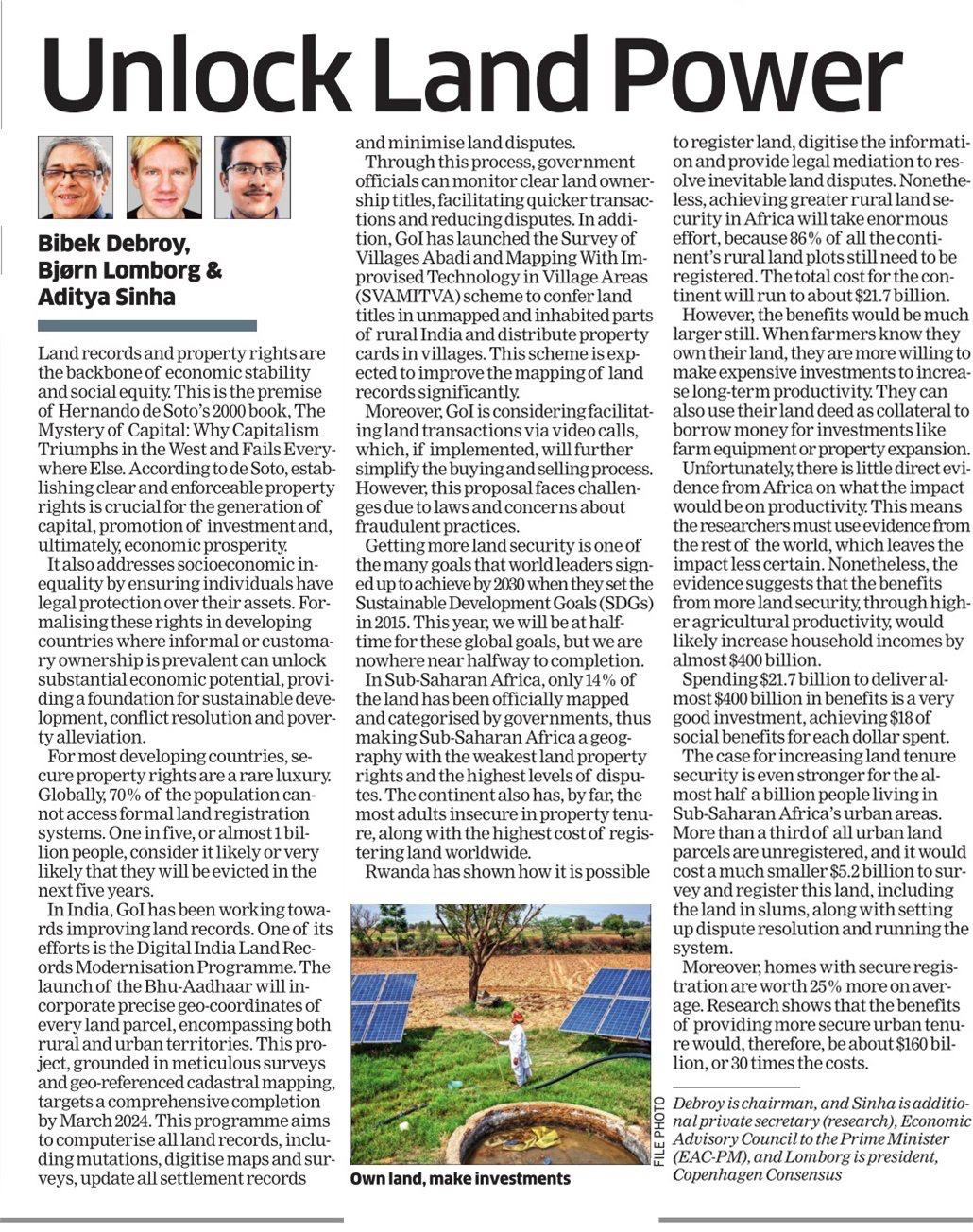Unleash the "land-locked" prosperity
Reform Potential of Urban Land Policy: Unlocking Fortune in "Land-locked" Areas
Dharavi in Mumbai: Asia’s biggest slum.
Land— the ultimate asset: Land, whether in major urban cities of India or elsewhere in the world, carries significant power, value, and importance as a fundamental source of shelter, security, and economic stability. A critical component related to land is the recording of property titles, which encompasses essential information about the owners, occupants, and the legal status of possession, such as tenancy, mortgage, or license.
British-era Land Records: During British rule in India, a highly efficient system of land records was established to collect land revenue, which was considered a "sovereign due." Drawing from historical practices, the colonial rulers developed a statutory framework, heavily influenced by the systems of Sher Shah Suri and Diwan Todar Mal during Emperor Akbar's reign. This framework evolved as the British expanded their rule from Bengal to the United Provinces and finally annexed Punjab in 1849. The Punjab Land Revenue Act of 1887, considered the pinnacle of this system, is still in use today with minimal amendments.
Other Central Laws: Similarly, laws such as the Transfer of Property Act, 1882, the Stamp Act, 1899, and the Registration Act, 1908, continue to operate across the country. While some may consider these systems outdated, they have proven resilient, surviving World Wars and the Partition of 1947. They facilitated efficient settlement of claims by displaced persons from Pakistan and played a vital role in various land-related reforms, including consolidation of holdings, tenancy reforms, conferment of proprietary rights, implementation of surplus area laws, and the payment of compensation in land acquisition matters.
Computerisation of Land Records: In recent years, states like Karnataka and Punjab have pioneered the computerization of land records. The Government of India has launched the nationwide "Digital India Land Records Modernisation Programme" and embarked on initiatives to survey and map village "abadi deh" lands, traditionally outside the purview of state Land Revenue Laws. The benefits of modern technology in land records are evident, with more accurate measurements aided by global positioning systems, satellite imagery, and drone photography. These advancements expedite surveys, particularly in densely built urban centers and village "lal doras" where traditional surveys may not be feasible. Moreover, changes in title resulting from registered sale deeds can be reflected almost in real-time in computerized land records databases.
Computerisation cannot determine title: It is, however, essential to recognize the limitations of technology. Computerization alone cannot resolve disputes regarding title, ownership, possession, or succession, which are typically settled through civil courts or mutation proceedings conducted by land revenue officers. In many urban centers, traditional land revenue records are either nonexistent or outdated, providing limited information about plot dimensions or actual physical possession. Nevertheless, a “registry” followed by a mutation is widely a considered conclusive proof of title or ownership. Such documents are accepted officially, by lending financial institutions, and by secondary market players involved in property transactions. In cases where mutation is not feasible, the property tax or house tax receipt from the relevant municipal body may create a presumption of ownership or possession. Names on electricity bills or water/sewage bills may also be indicative of ownership or at least possession.
Bibek Debroy in ET: The article "Unlocking Land Power," recently published by Bibek Debroy1 and co-authors, eloquently explores the potential of efficient computerized land records systems in unlocking the value of urban land, particularly land occupied by the urban poor. This modernized system can serve as an instrument of social empowerment, increase market value, and enhance the acceptability of registered titles as collateral for obtaining loans. However, the authors did not address a significant challenge: the majority of these ramshackle developments exist as veritable slums, with the underlying land ownership belonging to the state, municipal bodies, or urban development authorities.
Thriving Gray Market: In the absence of valid titles conferred through a certificate of ownership under existing laws, sale and purchase transactions occur primarily in the grey market and not through registered sale deeds. Sub-registrars, adhering to the law, are reluctant to register such documents for tenements considered illegal occupation, if not encroachment, of valuable government land. This practice not only depresses property market values but also deprives state governments of substantial stamp duty revenue. It further leads to possession disputes and involves various stakeholders such as land revenue officials, municipal inspectors, the police, and land mafias.
“In situ” development of slums: The Government of India's current policy of "in situ" development for slums offers a more inclusive and sustainable approach compared to slum clearance. Rather than uprooting inhabitants, the focus is on upgrading existing slums and providing basic urban services. Participatory planning ensures tailored solutions, and the government offers financial and technical support for sustainable improvements, including water, sanitation, and electricity provisions. While this approach has shown success in transforming slums and improving inhabitants' lives, the challenge of granting formal ownership to slum dwellers persists due to complex legal, administrative, and political factors.
Constraints and Roadblocks: Granting formal ownership of land and super-structures thereon to slum dwellers remains a significant challenge due to various factors. This process requires expertise from multiple disciplines, which traditional land revenue officers, municipal staff, and town planners lack. Additionally, there is a need for an enabling statutory framework that is currently absent. The properties in question are considered valuable, and issuing a certificate of title is viewed as a substantial financial benefit for unauthorized occupants. Local politics, corruption allegations against staff, inaccurate assessment of possession, and involvement of land mafias further complicate the situation, creating a daunting task for the respective public servants and local politicians.
Title Certificate remains elusive: Consequently, the crucial final step of providing a formal certificate of ownership remains elusive for many potential beneficiaries. It is important to note that the constraint lies not in land records, surveys, or computerization, but rather in these complex and seemingly insurmountable problem of determining the eligibility of the title certificate expeditiously that cannot be resolved through conventional approaches.
Conferment of title— way forward: Addressing these challenges requires a strong political consensus at the state level and the appointment of a senior bureaucrat with a proven track record of efficiency, effectiveness, and integrity to act as a policy champion. This individual should be empowered to assemble their own team and the officials of the land revenue departments and municipal bodies should be made accountable to them. Ideally, they should report directly to the Chief Minister, ensuring necessary oversight.
Owner’s equity essential: Additionally, occupants receiving ownership documents should be required to contribute approximately 10% of the land value (as per circle rates/collector rates). This amount should be manageable for any occupant, considering that the value of the property being passed on to them is at least ten times their equity. If payment is made in installments, a letter of intent should be issued initially, and the final certificate of ownership granted only after complete government dues have been paid.
Freely transferable, with safeguards: Once fully paid, the property should be freely transferable, as restrictions in this regard are counterproductive and give rise to a grey market of sales through power of attorney, which defeats the purpose of the reforms. Beneficiaries should be identified through Aadhaar, along with other proof of identification, and a condition should be imposed to ensure that they shall not receive the benefits of any such or similar a scheme elsewhere. Aadhaar seeding can help ensure this.
A Reform Overdue: The urban poor is a constituency often neglected in political discourse. As India becomes increasingly urbanised, this segment of the society would be very difficult to ignore, irrespective the perspective it is viewed. The current government has demonstrated the political will to drive this long-awaited reform, which offers minimal downside risks, modest capital investment, and significant socio-economic and political dividends. Can we expect some state having the benefit of a “double-engine sarkar” to take lead in this regard and serve as an example for the rest of the country?
Mr Bibek Debroy is the Chairman of the Economic Advisory Council to the Prime Minister of India.






The colonial land record system is still the best. Hardly half of it is being used, and that too half heartedly. Every cog in the wheel fancies himself the fulcrum and mutilates the body of law in the name of expediency. There's no accountability for mistakes made in the creation of records, which keeps the public exercised for generations to come.
Urban mess is the result of official apathy, corruption, and communalism. Much more govt land is under illegal occupation than is officially admitted. Those behind these illegal occupations are the land sharks, and corrupt politicians and govt servants. If every inch of govt land is under a land inspector at all times, how is it that lands are occupied, built upon, sold and resold whithout the govt knowing of it.
The situation can be helped only if honest and go-getter officers from the area concerned, who know first hand when and how a particular area has been encroached upon, are brought in to clear the mess. Any govt that does this stands to reap rich dividends.
The land Reforms job is great challange to the govt. Politicians some time like to improve but over brotherhood does not give them any know how. Ultimately the crux of the issue is,,will power of the state cm. If he intends, he can find one committed talented officer of calibre
and integrity. From the day one, I am fighting for it. I am of the opinion that it is doable provided cm wants it to be done.
Any one who does, shall have the stature as high as equal to sir chhotu RAM